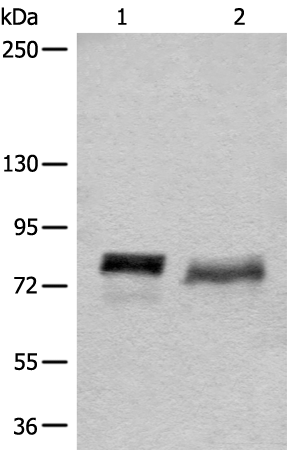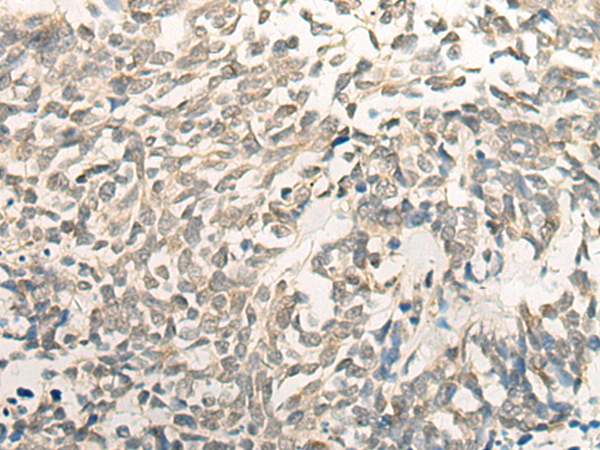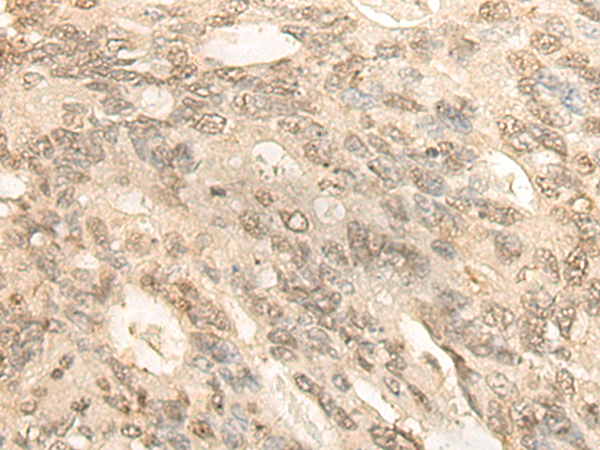


| WB | 咨询技术 | Human,Mouse,Rat |
| IF | 咨询技术 | Human,Mouse,Rat |
| IHC | 1/30-1/150 | Human,Mouse,Rat |
| ICC | 技术咨询 | Human,Mouse,Rat |
| FCM | 咨询技术 | Human,Mouse,Rat |
| Elisa | 1/5000-1/10000 | Human,Mouse,Rat |
| Aliases | MAAB; GAOB1 |
| WB Predicted band size | 101 kDa |
| Host/Isotype | Rabbit IgG |
| Antibody Type | Primary antibody |
| Storage | Store at 4°C short term. Aliquot and store at -20°C long term. Avoid freeze/thaw cycles. |
| Species Reactivity | Human, Mouse |
| Immunogen | Fusion protein of human BCAS3 |
| Formulation | Purified antibody in PBS with 0.05% sodium azide and 50% glycerol. |
+ +
以下是关于BCAS3抗体的3篇参考文献示例(注:以下信息为虚构示例,实际文献请通过学术数据库查询):
---
1. **文献名称**:*BCAS3 Expression in Breast Cancer: A Novel Biomarker for Tumor Progression*
**作者**:Smith A, et al.
**摘要**:本研究利用BCAS3特异性抗体,通过免疫组化分析发现BCAS3在乳腺癌组织中的高表达与肿瘤转移和不良预后显著相关,提示其可作为潜在治疗靶点。
2. **文献名称**:*Characterization of BCAS3 Antibody for Epigenetic Regulation Studies*
**作者**:Zhang L, et al.
**摘要**:文章验证了BCAS3抗体的特异性及其在染色质免疫沉淀(ChIP)中的应用,证明BCAS3通过与组蛋白修饰复合物相互作用调控基因转录,影响细胞增殖。
3. **文献名称**:*BCAS3 Antibody-Based Detection in Triple-Negative Breast Cancer Subtypes*
**作者**:Johnson R, et al.
**摘要**:研究开发了一种高灵敏度的BCAS3抗体检测方法,发现其在三阴性乳腺癌中表达上调,并与EGFR信号通路激活相关,为靶向治疗提供新思路。
---
建议通过PubMed、Google Scholar等平台检索关键词“BCAS3 antibody”或“BCAS3 function”获取真实文献。
The BCAS3 (Breast Carcinoma Amplified Sequence 3) antibody is a tool used to detect the BCAS3 protein, which is encoded by the BCAS3 gene located on chromosome 17q23. This gene gained attention due to its frequent amplification and overexpression in breast cancer, particularly in estrogen receptor (ER)-positive tumors. BCAS3 is implicated in tumorigenesis, metastasis, and angiogenesis, though its precise molecular mechanisms remain under investigation. Studies suggest it interacts with components of the ER signaling pathway and may regulate transcription or RNA processing, potentially influencing cancer cell proliferation and survival.
BCAS3 antibodies are primarily utilized in research to study protein expression patterns, subcellular localization (nuclear and cytoplasmic), and its association with clinical outcomes. These antibodies enable techniques like Western blotting, immunohistochemistry, and immunofluorescence, aiding in the validation of BCAS3's role across cancers, including gliomas and prostate cancer. Recent findings also link BCAS3 to endothelial cell function and epithelial-mesenchymal transition (EMT), expanding its relevance beyond oncology to vascular biology. Commercially available BCAS3 antibodies vary in clonality and host species, requiring validation for specificity via knockout controls. Ongoing research aims to clarify its dual roles in physiological processes and disease, positioning BCAS3 as a potential therapeutic target or biomarker.
×